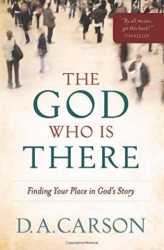A Brief Book Summary from Books At a Glance
by Steve West
Introduction
The God Who is There walks the reader through the plotline of the Bible. It is designed as an introductory book for many different types of readers, including those who know nothing about the content of the Bible. Carson exposits the major turning points of the Scriptures, outlining the biblical narrative, and showing the coherence and applicability of the gospel. This book has been widely read and used in numerous study groups. It will not surprise anyone who is familiar with Carson’s books that although this book is introductory, even seasoned and mature Christians will see new things and learn more about their faith when they read it.
Table of Contents
1 The God Who Made Everything
2 The God Who Does Not Wipe Out Rebels
3 The God Who Writes His Own Agreements
4 The God Who Legislates
5 The God Who Reigns
6 The God Who is Unfathomably Wise
7 The God Who Becomes a Human Being
8 The God Who Grants New Birth
9 The God Who Loves
10 The God Who Dies—and Lives Again
11 The God Who Declares the Guilty Just
12 The God Who Gathers and Transforms His People
13 The God Who is Very Angry
14 The God Who Triumphs
Summary
Chapter 1: The God Who Made Everything
The Bible is a book that is made up of the documents that are foundational for Christianity, and God himself has specially spoken and revealed himself in them. These writings are God’s word. They consist of a great number of genres, and are written over 1500 years in three different languages, but tell one integrated, unified story. The Old Testament moves from creation to the time right before Jesus. The New Testament is written in the first century, and it focuses on Jesus but also looks to the end of the age. The first book of the Bible is Genesis, and its first chapters describe how God creates everything. There is no scientific fact that counts against the Genesis material, and there is evidence of design in the universe. Creation is often greeted with awe even by atheists.
In these opening chapters of the Bible, we learn some very important preliminary facts about God. One of the first things we learn is that God simply is. God is completely independent of everything, but everything depends on him. He is the creator and sustainer of everything. There is only one God: he has no equal and there is no one else like him. God is a talking God; he communicates. He creates through his speech, and his creation is very good and proclaims his glory. Human beings are made in God’s image, and although there have been myriad debates about exactly how human beings bear God’s image, there are a few things we can note for now. Human beings are both similar to, and dissimilar from, other animals in creation. Like God, we can communicate, think, work, create, and enjoy rest. We have a sense of morality and are not made to embrace nihilism. God made mankind male and female, and they were created innocent and without sin. Genesis 1-2 is foundational for the story of Scripture and for understanding God, the universe, and ourselves. It shapes our worldview and grounds our sense of morality and responsibility. . . .
[To continue reading this summary, please see below....]The remainder of this article is premium content. Become a member to continue reading.
Already have an account? Sign In
